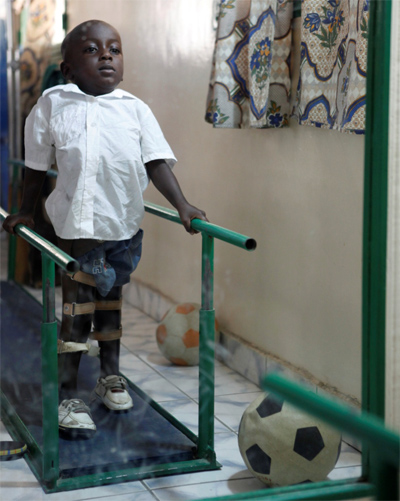
Since contracting polio at 18 months, Idriss, now 4 years old, is learning to walk with leg braces in N’Djamena, Chad. (© UNICEF/PFPG2013P-0374/)
We are in the final stretch of the Flu Campaign. This is the last week to get your flu shot and make a donation to a child in need through UNICEF Canada. This week, if you get your flu vaccine, we will donate two vaccines to UNICEF – with one vaccine for yourself, you can help two children.
We have donated over 10,000 vaccines so far, but we still have a ways to go in order to reach our 70 per cent goal. Make sure to choose prevention and protect yourself, your loved ones, our patients and (this week) two children with one flu shot.
Here's an example of how your flu shot can make a difference around the world:
All Idriss wants to do is play outside with the other children in his neighbourhood of N'Djamena, Chad. Instead, he is in a clinic learning how to walk with the help of a pair of leg braces. When Idriss was only 18 months old, polio paralyzed him from the waist down. Since being disabled by the disease, Idriss, now 4, has learned to move his body through the use of his hands and his parents have built him a stand to practice holding himself up.
Today, he is learning to use leg braces that are designed to help polio victims with mobility. Stabilized by two iron bars, he uses his upper body to move his legs. He is exhausted by the end of the first round but he doesn't sit down.
His dad talks about how lively Idriss had been before the paralysis, and how he had received the first round of vaccination, but had become ill before his booster. He says that every day when he came home from work, he prayed that he would see Idriss running around with the other kids. Instead, he would see him in the house, all alone.
Widespread poverty and past conflict have contributed to a weak health care system that enables polio to spread whenever re-introduced in the country. In response to the rising number of polio infections, the Government of Chad, UNICEF and partner agencies are stepping up their efforts to combat further polio infections. This particularly includes technical support (e.g. cold chain and logistics, tracking systems to ensure children get their required doses over a period of time, developing polio outbreak response plans and monitoring outbreaks) as well as social mobilization to make sure parents are aware of the benefits of immunization and are actively bringing their children to be included in immunization programs.
Children like Idriss shouldn't have to suffer from a disease which we have the technology to prevent and even eradicate forever.
This article was printed in the For Every Child UNICEF Canada Magazine. For more information, please visit UNICEF Canada's website.To learn more about vaccine donations, please visit
UNICEF Canada's giving guide and the UNICEF Canada website.
